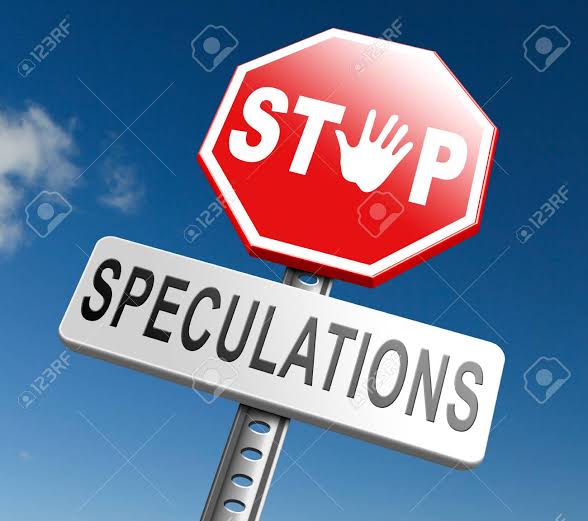By Abdullahi Yusuf
It has been established over time that Speculation is part of human behaviour. People speculate about things in order to achieve certain objectives for their own benefits.They also speculate to knowingly or unknowingly, harm others,or even themselves.
According to a Dictionary, the word “Speculation” refers to “the forming of a theory or conjecture without firm evidence.”Another Dictionary defines it as” the act of guessing possible answers to a question without enough information to be certain.”
Speculations have become part of our national life, nowadays,with Nigerians speculating or guessing about virtually everything that affects them as a people.
Unfortunately,the speculations which are largely disseminated on social media platforms and through the Word of Mouth,have adverse consequences on our socio-economic lives.
Some recent examples of speculations that impacted negatively on us as citizens included unverified information that petrol marketers would jerk up the pump price of the commodity to N720 per litre as against the prevailing N620.
This rumour had sent jitters down the spine of the citizes,with many of them embarking on panic buying of petrol,which also motivated many unscrupulous fuel station managers to either shut down their facilities or embark on skeletal services.
Fortunately, the Presidency, the Independent Petroleum Marketers as well as the NNPC came out to dismiss the speculation, saying that there was no such plan.But the clarification came after prices of goods and services had begun to increase on account of the unfounded rumour.
Such prices may never revert to their former regime,if our experiences with the Nigerian market situation are anything to go by.
Another example is the current downward slide of the Naira against the US dollar.This frightening development that now makes one dollar to exchange for about N950 was projected by Currency Speculators some time ago.
Currency speculation is another genre of speculation.This one, economists say, is the act of buying and selling the currencies of various countries in order to take advantage of the fluctuating exchange rates.
That “some speculators make many transactions each day with one or more currency pairs, while others purchase a large amount of one currency and then hold on to it for a longer time.”
Recall that it has been cruelly speculated that the dollar would exchange for N1000 before the end of this year,and that unless something is done by the Federal Government to arrest the disturbing slide,the exchange rate may hit the N1000 to one dollar mark,sooner than later.
Thank God that the Central Bank of Nigeria has reportedly started introducing foreign exchange intervention measures aimed at clamping down on currency speculators in the nation’s foreign exchange markets.
The acting Governor of the CBN, Folashodun Shonubi,disclosed this to State House Correspondents at the Presidential Villa after briefing President Bola Tinubu on what the bank was doing to halt the slide of the Naira.
Shonubi said Tinubu had expressed concern over the effects of the recent developments in the foreign exchange market, particularly on average citizens.
According to the CBN acting Governor, the volatility of the Naira in the parallel market is not solely driven by economic factors, but also “speculative demand.”
Other speculations also abound in businesses including property deals and selling of essential commodities such as foodstuff,toiletries and drugs whose prices are just assumed by speculators and they eventually prevail.
It is like both the dealers and retailers of the commodities listen to the speculators’ “Prescription” first, before they fix their cut-throat prices,that is after the helpless buyers’ mind had already been prepared for them.
Speculation of prices and rates in all sectors of our national economy, experts say,escalates the current inflationary trend in the country,thus worsening the hardships being faced by the people.
They warn that the aformentioned speculations among others, aggravate the price volatility in the markets which adversely affects the economy and which invariably impedes growth and development in the country.
May we refrain from idle speculations to allow growth and development to thrive in the polity.


